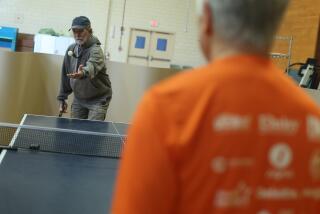COUNTYWIDE : Club Helps Seniors and Care Givers
Every Saturday morning, a small group of seniors gathers at the St. Jude Continuing Rehabilitation Center in Fullerton for a little conversation and exercise. But this gathering is as much for the family members left at home as for the participants.
This Saturday Club, as it is called, is for seniors who have suffered memory loss.
Care givers are often faced with having to monitor the movements of a memory-loss adult on a 24-hour basis. For instance, those with Alzheimer’s disease are often agitated and will wander, sometimes in the middle of the night.
Most families with members who have suffered memory loss from strokes or Alzheimer’s want to keep their loved ones at home as long as possible, according to Joyce Bryan, director of the Orange County Caregivers Resource Center of St. Jude Medical Center, which runs the program.
“When one is caring for a brain-impaired adult, it’s not just the memory loss they have to contend with, there is a change in the personality and the behavior of the spouse or family member,” Bryan said.
Having a reprieve from the constant demands of caring for a brain-impaired adult is essential to maintain the health of the care giver, Bryan said. That is where programs like the Saturday Club can help. It gives the care givers a chance to relax and do something for themselves.
The club was started three years ago as a place for people with memory loss to socialize in a non-threatening atmosphere, Bryan said. There are many social programs in the county for seniors, but people with memory loss are often too intimidated to participate in those programs.
“They are sensitive to the changes they’re undergoing,” Bryan said. “They know something’s wrong, but they can’t figure out what. And they can tell when people are laughing at them or treating them with disrespect.”
The club meets for four hours and provides a structured program of games, exercise and conversation. It is staffed by volunteers so the cost can be kept low. Participants pay $20 a week, although scholarships are available if the cost proves to be a hardship.
As “members” of the club, participants are encouraged to join in all the activities and communicate their own wants and needs. Bryan said it is important to treat people with memory loss with dignity and respect, adding that often there is the tendency to treat them as children instead of adults.
The size of the club is kept low, about six to 10 participants per session, to ensure that the atmosphere remains intimate and friendly, she added.
The club program has proved to be such a success that a new club will soon be offered, funded by a recent $9,062 grant from United Way of Orange County. The new club is scheduled to begin next year.
More to Read
Sign up for Essential California
The most important California stories and recommendations in your inbox every morning.
You may occasionally receive promotional content from the Los Angeles Times.










